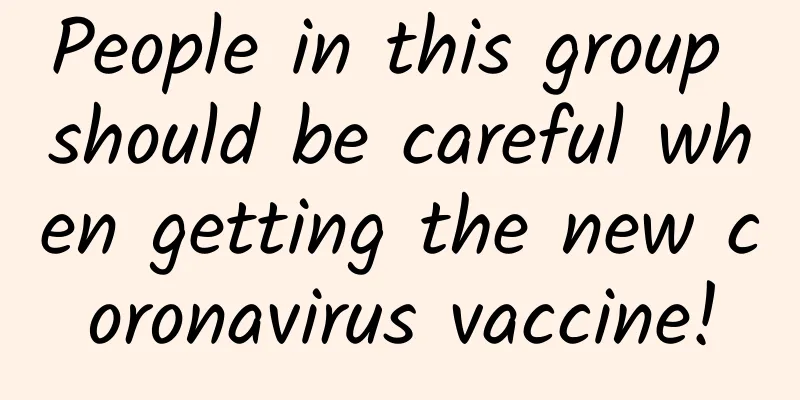People in this group should be careful when getting the new coronavirus vaccine!

|
Spring is the peak season for pollen allergies Can patients with pollen allergies get the new coronavirus vaccine? What should I pay attention to if I get vaccinated? What methods are effective in preventing pollen allergies? Let's listen to the experts' answers At the press conference of the Joint Prevention and Control Mechanism of the State Council held on April 6, Wang Huaqing, chief expert of the immunization program of the Chinese Center for Disease Control and Prevention, made it clear that spring is the peak season for pollen allergies, and a history of pollen allergies is not a contraindication to the COVID-19 vaccine. Only those who are allergic to the COVID-19 vaccine, or are allergic to the ingredients in the COVID-19 vaccine, or have had severe allergies to other vaccines in the past, are contraindicated from the COVID-19 vaccine. So Vaccination for people with pollen allergies Are there any special considerations? Wang Huaqing said that if a person who is allergic to pollen is in the acute stage of allergy, especially if the pollen allergy causes severe symptoms such as asthma, vaccination should be delayed. For those who have a history of pollen allergy and can be vaccinated, they should inform the clinician or vaccinating doctor when they are vaccinated, and they should also strictly abide by the rule of staying for observation for 30 minutes after vaccination. In most parts of my country, the spring peak from April to June and the autumn peak from August to September are the two peak seasons for pollen allergies each year. In this regard, Wang Huaqing said that when flowers bloom in spring, some people with a history of pollen allergies begin to suffer from symptoms, including itchy eyes, sneezing, coughing, and severe asthma complications. For sensitive people How to prevent pollen allergy? Experts give some practical tips If you are allergic to pollen, experts suggest that you can use some medications to relieve symptoms, but do not use them indiscriminately and avoid using topical medications containing chlorine or fluoride, especially for eye allergies. It is not recommended to buy eye drops on your own because some anti-allergic eye drops contain hormones, which may cause the risk of glaucoma. In addition, some high-protein foods, which are called "hair-inducing" foods in traditional Chinese medicine, such as fish, shrimp, seafood, beef, mutton, and peppers, are likely to stimulate a state of high sensitivity after being eaten in this season. Source: Xinhuanet Final judge: Zhang Qingshui Author: Wang Ying Editor: Lu Junyu Proofreading: Yao Runping |
>>: Five little-known facts about peony
Recommend
Pinduoduo virtual store, single store earns 200-1000 per day
The 2021 Pinduoduo side job project group is offi...
This “sugar and oil mixture” makes you fatter than drinking oil. Why can’t you stop eating it once you start?
Crispy on the outside and tender on the inside, g...
Is irradiated food related to radiation? Can we eat it safely?
As the saying goes, "food is the first neces...
Yishen Aogu "Aojiajun Military Academy" stock lecture video tutorial
Yishen Aogu "Aojiajun Military Academy"...
The all-new Audi Q3 is launched, and FAW-Volkswagen Audi brings a number of star models to the 2019 Shanghai Auto Show
On April 16, 2019, the 18th Shanghai Internationa...
Fighting monsters, carving, starting nuclear fusion, why are you everywhere?
When I was a kid, I sat in front of the TV and wa...
China's grain distribution map: How much grain do the three northeastern provinces produce each year?
China's grain distribution map Where are the ...
Yan Jie 14-day stretching light yoga (fast-acting weight loss metabolism technique)
Yan Jie 14-day stretching light yoga (fast-acting...
Tik Tok Marketing Tips: Comprehensively Understand the Star Map Platform!
What is Star Chart Platform? In September 2017, t...
Content Marketing Trends in 2017 (Part 1)
Content Marketing Trends in 2017 (Part 2) Preface...
Information flow advertising delivery is unstable, how to optimize it?
Written in front In response to recent feedback fr...
Apple's 2020 iPhone, see if there is one you like
iPhone SE SE will finally meet us officially in 2...
In addition to PV and UV, product operations also need to pay attention to these indicators!
In the past six or seven years, I have been starti...
Microsoft HoloLens ushers in the era of "brain intubation". Is The Matrix about to become a reality?
I believe that those who have watched "The M...
“Picture” you don’t know | Perfect golden ratio
Source: Guangxi Science and Technology Museum...









